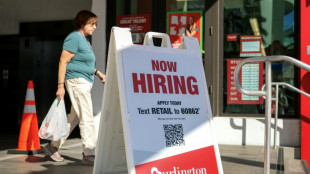-
 Australian PM says 'Islamic State ideology' drove Bondi Beach gunmen
Australian PM says 'Islamic State ideology' drove Bondi Beach gunmen
-
Canada plow-maker can't clear path through Trump tariffs

-
 Bank of Japan expected to hike rates to 30-year high
Bank of Japan expected to hike rates to 30-year high
-
Cunningham leads Pistons past Celtics

-
 Stokes tells England to 'show a bit of dog' in must-win Adelaide Test
Stokes tells England to 'show a bit of dog' in must-win Adelaide Test
-
EU to unveil plan to tackle housing crisis

-
 EU set to scrap 2035 combustion-engine ban in car industry boost
EU set to scrap 2035 combustion-engine ban in car industry boost
-
Australian PM visits Bondi Beach hero in hospital

-
 'Easiest scam in the world': Musicians sound alarm over AI impersonators
'Easiest scam in the world': Musicians sound alarm over AI impersonators
-
'Waiting to die': the dirty business of recycling in Vietnam

-
 Asian markets retreat ahead of US jobs as tech worries weigh
Asian markets retreat ahead of US jobs as tech worries weigh
-
Security beefed up for Ashes Adelaide Test after Bondi shooting

-
 Famed Jerusalem stone still sells despite West Bank economic woes
Famed Jerusalem stone still sells despite West Bank economic woes
-
Trump sues BBC for $10 billion over documentary speech edit

-
 Chile follows Latin American neighbors in lurching right
Chile follows Latin American neighbors in lurching right
-
Will OpenAI be the next tech giant or next Netscape?

-
 Khawaja left out as Australia's Cummins, Lyon back for 3rd Ashes Test
Khawaja left out as Australia's Cummins, Lyon back for 3rd Ashes Test
-
Australia PM says 'Islamic State ideology' drove Bondi Beach shooters

-
 Scheffler wins fourth straight PGA Tour Player of the Year
Scheffler wins fourth straight PGA Tour Player of the Year
-
Security beefed up for Ashes Test after Bondi shooting

-
 Wembanyama blocking Knicks path in NBA Cup final
Wembanyama blocking Knicks path in NBA Cup final
-
Amorim seeks clinical Man Utd after 'crazy' Bournemouth clash

-
 Man Utd blow lead three times in 4-4 Bournemouth thriller
Man Utd blow lead three times in 4-4 Bournemouth thriller
-
Stokes calls on England to 'show a bit of dog' in must-win Adelaide Test

-
 Trump 'considering' push to reclassify marijuana as less dangerous
Trump 'considering' push to reclassify marijuana as less dangerous
-
Chiefs coach Reid backing Mahomes recovery after knee injury

-
 Trump says Ukraine deal close, Europe proposes peace force
Trump says Ukraine deal close, Europe proposes peace force
-
French minister urges angry farmers to trust cow culls, vaccines

-
 Angelina Jolie reveals mastectomy scars in Time France magazine
Angelina Jolie reveals mastectomy scars in Time France magazine
-
Paris Olympics, Paralympics 'net cost' drops to 2.8bn euros: think tank

-
 Chile president-elect dials down right-wing rhetoric, vows unity
Chile president-elect dials down right-wing rhetoric, vows unity
-
Five Rob Reiner films that rocked, romanced and riveted

-
 Rob Reiner: Hollywood giant and political activist
Rob Reiner: Hollywood giant and political activist
-
Observers say Honduran election fair, but urge faster count

-
 Europe proposes Ukraine peace force as Zelensky hails 'real progress' with US
Europe proposes Ukraine peace force as Zelensky hails 'real progress' with US
-
Trump condemned for saying critical filmmaker brought on own murder

-
 US military to use Trinidad airports, on Venezuela's doorstep
US military to use Trinidad airports, on Venezuela's doorstep
-
Daughter warns China not to make Jimmy Lai a 'martyr'

-
 UK defence chief says 'whole nation' must meet global threats
UK defence chief says 'whole nation' must meet global threats
-
Rob Reiner's death: what we know

-
 Zelensky hails 'real progress' in Berlin talks with Trump envoys
Zelensky hails 'real progress' in Berlin talks with Trump envoys
-
Toulouse handed two-point deduction for salary cap breach

-
 Son arrested for murder of movie director Rob Reiner and wife
Son arrested for murder of movie director Rob Reiner and wife
-
Stock market optimism returns after tech selloff but Wall Street wobbles

-
 Clarke warns Scotland fans over sky-high World Cup prices
Clarke warns Scotland fans over sky-high World Cup prices
-
In Israel, Sydney attack casts shadow over Hanukkah

-
 Son arrested after Rob Reiner and wife found dead: US media
Son arrested after Rob Reiner and wife found dead: US media
-
Athletes to stay in pop-up cabins in the woods at Winter Olympics

-
 England seek their own Bradman in bid for historic Ashes comeback
England seek their own Bradman in bid for historic Ashes comeback
-
Decades after Bosman, football's transfer war rages on

Boomers: Selfish or Scapegoats?
The debate over whether the Baby Boomer generation—those born between 1946 and 1964—deserves the label of "the most selfish generation in history" has intensified in recent years. Critics argue that Boomers have prioritised their own comfort and prosperity at the expense of future generations, while defenders point to their contributions to social progress and economic growth. This article explores both sides of the argument, drawing on economic, social, and cultural factors to assess the validity of the claim.
A Generation of Prosperity
The post-World War II era was a time of unprecedented economic growth, particularly in Western nations. Boomers grew up in a period of relative stability and prosperity, benefiting from expanding educational opportunities, affordable housing, and a booming job market. This generation was the first to enjoy the fruits of modern consumer culture, with access to new technologies, healthcare advancements, and a welfare state that provided a safety net. However, this prosperity has been criticised as a double-edged sword. While Boomers thrived, they are accused of failing to address long-term challenges such as climate change, economic inequality, and the sustainability of social security systems. The argument goes that their focus on short-term gains has left younger generations—particularly Millennials and Generation Z—facing a future of environmental degradation, housing crises, and precarious employment.
The Burden of Debt
One of the most frequently cited examples of Boomer selfishness is their approach to public debt. Over the past few decades, national debts have soared in many countries, driven by policies that prioritised tax cuts, increased spending on entitlements, and economic stimulus measures. Critics argue that Boomers, who have held political and economic power during this period, have been complicit in passing on this financial burden to future generations. The rising cost of healthcare, pensions, and social security, combined with stagnating wages for younger workers, has fuelled resentment. In some nations, national debt has increased dramatically since the turn of the century, a period during which Boomers dominated leadership positions. This fiscal irresponsibility, some argue, reflects a generational disregard for the future.
The Housing Divide
Housing is another area where Boomers are accused of hoarding wealth. In many developed countries, property prices have skyrocketed, making homeownership increasingly unattainable for younger generations. Boomers, who bought homes when prices were relatively low, have seen their property values soar, creating a wealth gap that is difficult for Millennials and Gen Z to bridge. Over the past few decades, average house prices have risen significantly while wages have remained largely stagnant. This has led to accusations that Boomers have pulled up the ladder behind them, benefiting from policies that favoured property ownership while younger generations are left renting or struggling to save for deposits.
A Legacy of Progress
However, it would be unfair to paint the entire generation with the same brush. Boomers have also been responsible for significant social progress. The civil rights movements of the 1960s and 1970s, which fought for racial equality, gender rights, and LGBTQ+ inclusion, were largely driven by Boomer activists. Their contributions to technology, healthcare, and education have also been transformative. The digital revolution, which laid the foundation for the modern internet and communication technologies, was spearheaded by Boomer innovators. Moreover, many Boomers have engaged in philanthropy and community service, challenging the notion that they are universally selfish.
Generational Perceptions
Another important factor to consider is the role of generational differences in shaping perceptions of selfishness. Younger generations, facing economic uncertainty and environmental crises, may view Boomers' actions through a lens of frustration. However, it is worth noting that every generation has faced criticism from its successors. The Silent Generation, who preceded the Boomers, were often derided for their conformity and conservatism, while Millennials have been labelled as entitled and overly reliant on technology. This cyclical nature of generational criticism suggests that the "selfish" label may be more a reflection of changing societal values than an objective truth.
Structural Influences
Furthermore, the accusation of selfishness overlooks the structural factors that have shaped Boomer behaviour. The economic policies of the late 20th century, particularly the rise of neoliberalism, encouraged individualism and short-term thinking. Boomers, like all generations, were influenced by the prevailing ideologies of their time. The shift towards deregulation, privatisation, and globalisation was not solely a Boomer creation but a broader political and economic trend. To single out Boomers as uniquely selfish ignores the complex interplay of historical forces that have shaped modern society.
Conclusion
In conclusion, while there is evidence to suggest that the Boomer generation has benefited disproportionately from economic and social conditions, labelling them as "the most selfish generation in history" is an oversimplification. Their contributions to social progress and innovation cannot be ignored, nor can the structural factors that have influenced their behaviour. The intergenerational debate is likely to continue, but it is essential to approach it with nuance, recognising that each generation operates within the constraints and opportunities of its time.

Ukraine: Russians die like fucking flies!

Antisocial Russian propaganda

Electric ferries: Cleaner ships vs. diesel?

Dead Russian scum in Ukraine

US Supreme Court: Trump must disclose tax returns

Moscow on alert after Crimea hit by ‘drone attack'

US Federal Reserve raises interest rate to highest level

Brasilien: Jair Bolsonaro Wahlniederlage ein

Austrian President: Second term!

Russian war crimes!

Economic chaos in Italy



